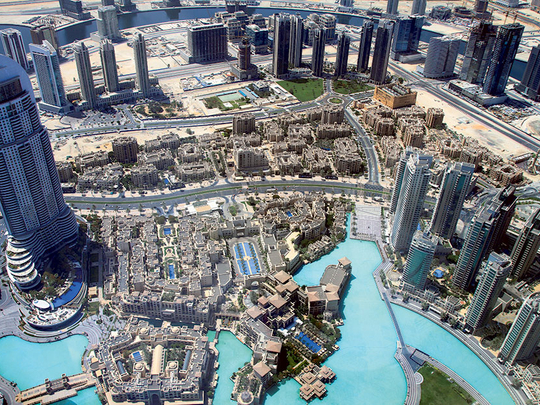
Dubai: The UAE’s real estate sector has been showing no signs of panic attacks over the collapse of oil prices in recent weeks. There have been no reports of investors suddenly trying to offload their properties fearing an imminent correction, nor are there indications that asking prices are being slashed in the hope of making a deal at any cost.
In short, the current crisis oil is facing is not going to spill over into Dubai’s realty immediately. But if oil remains under pressure for an extended period, that could upset the dynamic somewhat.
‘Declining average annual oil prices could impact the GDP as soon as Q3-16, although this trend is unlikely to directly impact Dubai real estate prices’, according to a recent report from Phidar Advisory. ‘No correlation was found between oil prices and real estate prices or GDP and real estate prices, which are a function of supply, demand and market psychology.
‘However, oil prices have an indirect influence on price: GDP fluctuations impact job growth and, thereby, impact demand’.
For now, transactional activity is still being maintained though gap is starting to narrow what a seller is asking and what buyers are prepared to offer. But high networth investors are not as readily obliging developers and property owners by snapping up whatever is available at the higher end of the property spectrum, making for lengthier transaction times. This has meant movement of high-end villas, in the Dh15 million to Dh50 million range, have been running flat.
“But the broader market is as steady as she goes ... to borrow a nautical phrase,” said Andrew Chambers, CEO of GGICO Properties. “If sellers are not getting their asking price, they prefer to hold or lease rather than sell way below their expectations. They are not heading for the exit doors.”
With the oil prices expected to remain under pressure unless Opec makes a sweeping intervention, stakeholders in Dubai’s property market will prefer not to rock the boat too strenuously. As yet, there are no indications that key off-plan launches scheduled for the first half of this year are being pulled back. Moreover, master-developers will still move ahead with the major tenders on various projects earmarked for completion ahead of the Expo 2020.
But private developers with ongoing projects — and a high inventory of unsold units — will have to better manage their cashflows if the buying appetite drops even further.
‘Although new supply exceeds new demand over a three-year time frame, the market remains close to equilibrium throughout, even falling below frictional vacancy in multiple years’, according to Phidar Advisory.
If Dubai’s residential space can hope to withstand oil’s slide in the interim, it could be a mixed prospect for commercial. In the last two quarters, take-up rates for offices had been inching higher as more stock got delivered in key commercial zones. For the right-sized office unit with the right address, the property owner did not have to wait long to net a tenant.
But the current oil price levels could leave that space vulnerable as businesses — those looking to enter this market or seeking a relocation — may take a wait-and-watch approach. Even otherwise, the office market is ripe for price/rent changes.
‘New supply will likely keep average rents stable for 2015 ... but an increase in new supply combined with unsustainable yields will lead to average sale price attrition’, Phidar reports. ‘The distribution of free zones and investment zones creates micromarkets with unique and divergent supply-demand dynamics, so actual area performance will vary’.
According to Jesse Downs, Managing Director at Phidar, “From an investment perspective, the performance of an office asset in Dubai is more sensitive to location than most markets. Even though the average trends and projections may seem muted, there are interesting investment options in Dubai.”
The prevailing sentiment is that Dubai’s property market has got the maturity to adjust to the new, slower, pace of demand. Developers will have to get more inventive in how they find new buyers for their off-plan ventures.
Whether that extends to revising their prices lower is a moot point.
“One would be surprised at the number of repeat buyers Dubai’s property can attract,” said Anand Lakhiani, Partner at Indigo Properties, the developers. “Developers don’t have to sell out everything in a week or a month of a project launch. They can always do with a bit of patience — low oil prices needn’t mean there are no takers for Dubai properties.”











